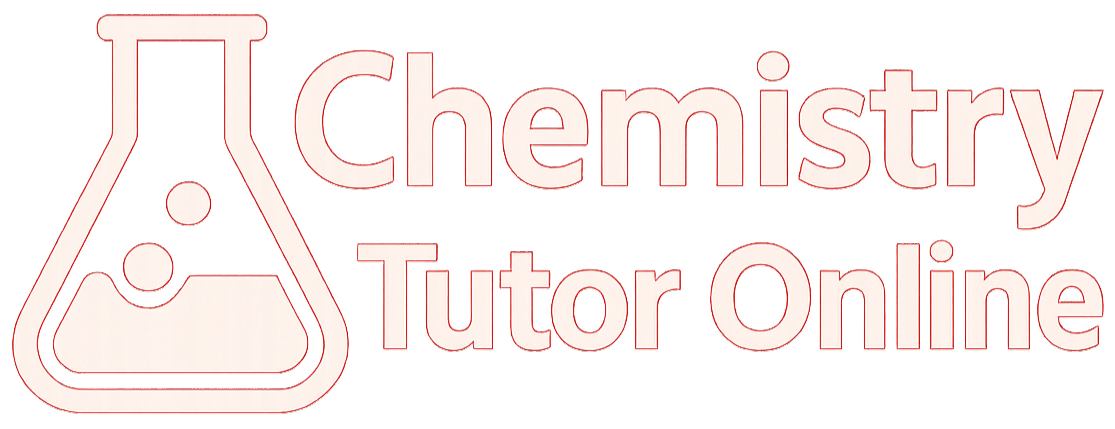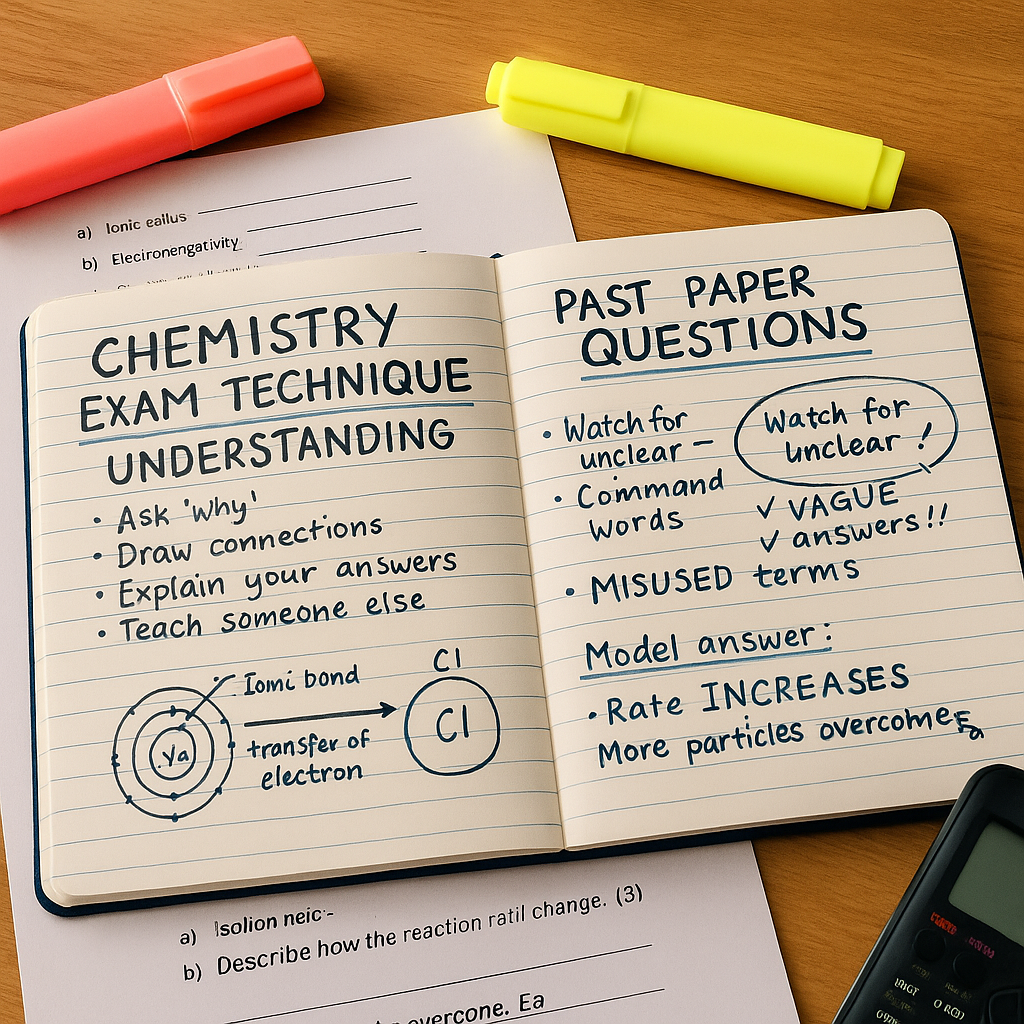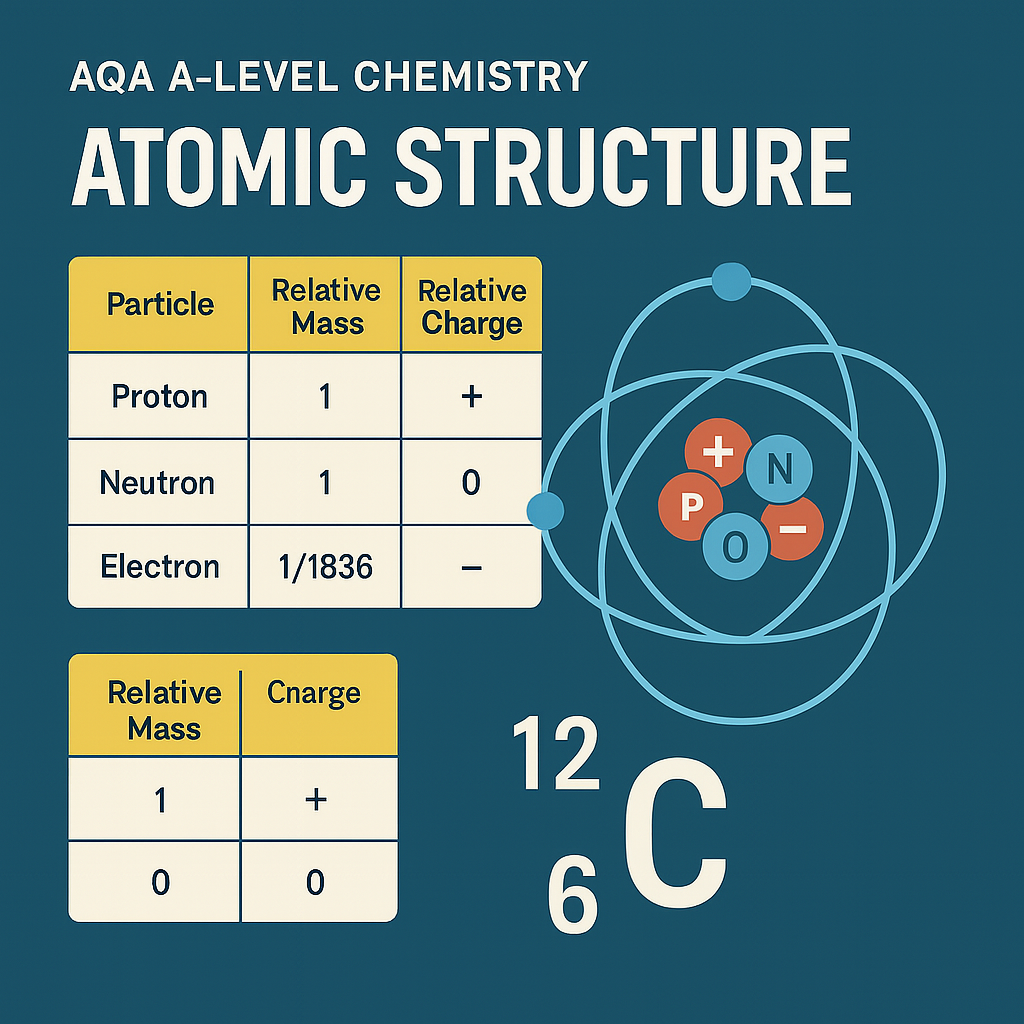Chemistry Exam Technique: Practical Study Tips That Work
Exam success is as much about technique and timing as it is about knowledge.
Many students revise hard for chemistry — but still feel unsure when they open an exam paper. Often, the issue isn’t just knowledge gaps. It’s how you apply what you know under exam conditions.
This guide is designed to help GCSE, A-Level, and IB students not only understand chemistry more clearly, but also sharpen their exam technique so they can turn understanding into marks.
Understanding Comes First — But It’s Not Enough
You might know the topic in theory, but still struggle when the question is phrased differently, presented in an unfamiliar context, or involves multi-step reasoning.
That’s because understanding and application are different skills.
To strengthen both, aim to:
Ask “why” — not just “what” — in every topic
Draw connections between topics (e.g. bonding and structure, equilibrium and rates)
Practise explaining your answers out loud or in writing
Teach a topic to someone else (even a non-chemist)
Deep understanding makes revision more efficient and improves your ability to deal with new or unexpected questions.
Learn to Spot What the Question Is Really Asking
One of the biggest pitfalls students face is misreading the command word. Knowing your content isn’t enough if you don’t understand what the examiner is looking for.
Here’s how to break it down:
State → Give a short, factual answer
Describe → Say what happens or what you observe
Explain → Say why it happens — always include a cause or reason
Evaluate → Give both strengths and weaknesses, with judgement
Calculate → Show every step, including units
The mark scheme rewards precision, not waffle. Learn how to write exactly what’s needed — no more, no less.
Use Past Papers to Practise Under Pressure
Past paper questions are your best preparation tool — but only if you use them actively.
Here’s how:
Start with topic-specific questions after finishing a chapter
Gradually move to mixed-topic practice (this mimics the real exam)
Use a timer to practise working under pressure
Mark your answers against the official mark schemes
Rewrite incorrect answers using the exact phrases the examiner wants
Exam success is as much about technique and timing as it is about knowledge.
10 Common Chemistry Exam Mistakes and How to Avoid Them
Here are a few patterns tutors and examiners see again and again:
Vague answers like “it increases” —-> Always say what increases and why
Confusing moles, mass, and Mr —-> Write out the triangle (n = m/Mr) and practise until it’s second nature
Forgetting state symbols or units —-> Add them every time, even when practising
Leaving multi-step calculations incomplete —-> Always include every step, even if it feels obvious
Misusing scientific terms —-> Stick to what’s in the specification — avoid guesswork
Mixing up endothermic and exothermic reactions —-> Remember: Endothermic = takes in heat (temp drop); Exothermic = gives off heat (temp rise). Use energy profile diagrams to reinforce.
Using the wrong ion charges in ionic formulas —-> Practise writing ions before formulae (e.g. Ca²⁺ + Cl⁻ = CaCl₂). Memorise common ions.
Forgetting to balance redox half-equations —-> Use the steps: balance atoms → balance O with H₂O → balance H with H⁺ → balance charge with electrons.
Assuming all acids are strong acids —-> Learn which are strong (HCl, HNO₃, H₂SO₄) vs weak (ethanoic acid, citric acid). Weak acids only partially dissociate.
Writing general statements like “it’s stable” —-> Use specific reasoning — e.g. “The molecule is stable because of delocalised electrons in the benzene ring.”
Your goal isn’t just to learn chemistry — it’s to learn how to demonstrate your knowledge clearly, consistently, and confidently.
Bring It All Together: A Smarter Study Strategy
To combine better understanding with stronger exam technique, try this weekly routine:
Pick one topic
Revise actively (flashcards, blurting, mind maps)
Do 3–5 past paper questions on that topic
Mark and analyse your answers
Write a one-paragraph summary of what you learned or missed
By doing this each week, you’ll build both content knowledge and exam confidence over time.
Final Thought
Chemistry exams aren’t just about remembering facts — they’re about showing that you understand the subject and can apply it logically, clearly, and accurately.
If you want tailored support with tricky topics or need help improving your exam technique, 1:1 tutoring can make a real difference.
Book a free session to explore how online chemistry tuition can help you get the results you’re aiming for.





Understand AQA A-Level Chemistry Section 3.1.1.2 on mass number and isotopes. Learn key definitions, isotope notation, calculations, and how this topic builds your scientific and exam skills.